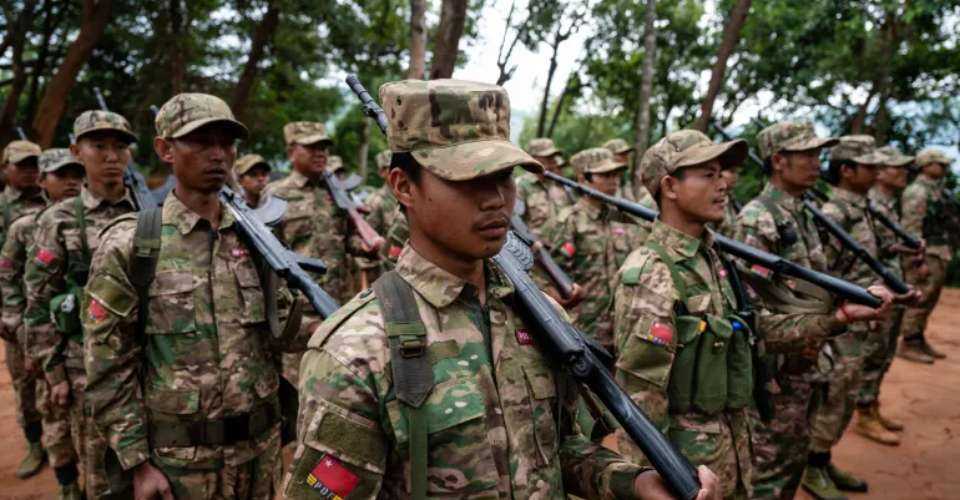
Ko Nyi, 33, fled his home in Tada-U town in central Myanmar to Myawaddy town near the Thailand border after his name was listed for mandatory military service.
It was shortly after the military junta passed the military service conscription law in February amid a series of defeats at the hands of anti-military resistance forces and defections of officers and soldiers.
The law requires men aged 18 to 35 and women aged 18 to 27 to be recruited into the military for two years, which can be extended to five years during an emergency.
For professional groups, such as medical doctors and engineers, the age limit is 45 for men and 35 for women, with a three-year service period.
The recruitment notice from the military authorities arrived at Ko Nyi’s house after he left home for the border town, which is now under the control of the rebel forces.
“After I left my town, the authorities notified my family that I would be recruited into the People’s Military Service. I feel safe here,” he told UCA News.
He is in touch with his family and friends back home, who say the military’s desperation to get conscripts by any means has upended the lives of people.
“It’s like hell in my town,” he said, adding that many local youths have been seeking refuge in safer areas to avoid forced recruitment.
The junta administration has announced legal action against those who flee to avoid conscription without a valid reason.
During a high-level meeting in the national capital Nay Pyi Taw on Nov. 7, Deputy Prime Minister and Union Minister for Defense Admiral Tin Aung San warned about stern action against escapees.
Local media reports say in Tada-U, Kyo Nyi’s hometown, more than 100 young men were forcibly attested for military service between Nov. 9-10.
Residents say the soldiers forced social organizations to seize cars to use them as transports for carrying the recruits from Tada-U.
A grocery owner, on condition of anonymity, said that amid chaos and panic in the community, businesses have been counting losses.
“There are very few buyers these days; most people are too frightened to go outside,” he said.
Allegations of financial crimes related to conscriptions have also surfaced.
During a recent meeting over military conscription, Tin Aung San called for eliminating financial corruption during recruitment.
Reports say that in conflict-torn Sagaing town, about 40 young men were arrested and forcibly taken to a military divisional headquarters. Their families have been told to pay for the release of their boys.
Ma Thu Zin, 32, a resident of Sagaing town, expressed anger over her brother’s forced recruitment.
“He’s been held for about two months, and we have no communication with him. My parents are worried,” she said.
Reports indicate that some communities face severe military recruitment efforts, forcing individuals to join battalions, while others pay bribes to avoid conscription.
“It’s not fair,” Ma Thu Zin noted, “because family members of police or military personnel are often exempt from recruitment.”
The penalties for evading conscription include three to five years in prison and hefty fines. While religious orders are exempt, civil servants and students may receive temporary deferments.
Starting in the first week of November, the military junta increased the number of people forced to work as porters in military units throughout the country. Most of these operations are conducted in Bago, Mandalay, Sagaing, Yangon, and Taninthayi regions.
Ma Yu Yu, a resident of Yangon’s Kyaukmyaung town, said that forcible military conscriptions are taking place at highway terminals, and some are being contacted door to door with their names listed.
Ma Yu Yu said her nephew was sent to the Thai capital, Bangkok, earlier this year to study in a college because the family feared he might be forcibly recruited into the army like many other young people.
Ko Thiha, a resident of Lanmadaw town near Yangon, currently studying for a master’s degree in the United Kingdom, shared his concerns about the conscription law.
“I received a calling letter at home, but I don’t have any connections in Yangon. My parents will present my university admission letter to prove I’m overseas. After I finish my studies, I won’t return to Myanmar,” he stated.
Major General Zaw Min Tun, the military spokesman, recently said that about 25 percent of the nation’s population is eligible for military service under the law. He said that, as per the law, about 60,000 men and women will be recruited as military conscripts each year.
As fear of forcible military conscriptions rises, anxious parents are sending their young sons and daughters to safer places.
A resident from Sanchaung town admitted that she had sent her son into border areas controlled by ethnic resistance organizations and the newly emerged People’s Defense Forces (PDF) for his safety.
“I worry about him daily, but I’m relieved he’s safe now,” she said.Sources say the military junta is ramping up recruitment by offering various incentives, such as additional salaries and bonuses, to police and soldiers involved.
“We need to persuade grassroots people by highlighting salaries, profits, and other benefits,” a police officer told UCA news on condition of anonymity.
source : ucanews
